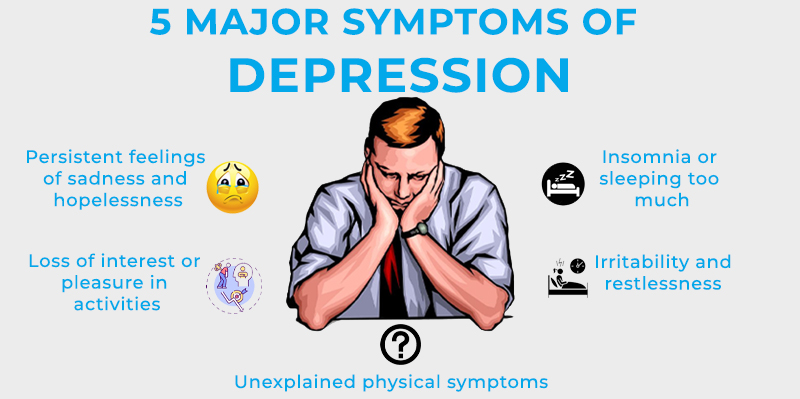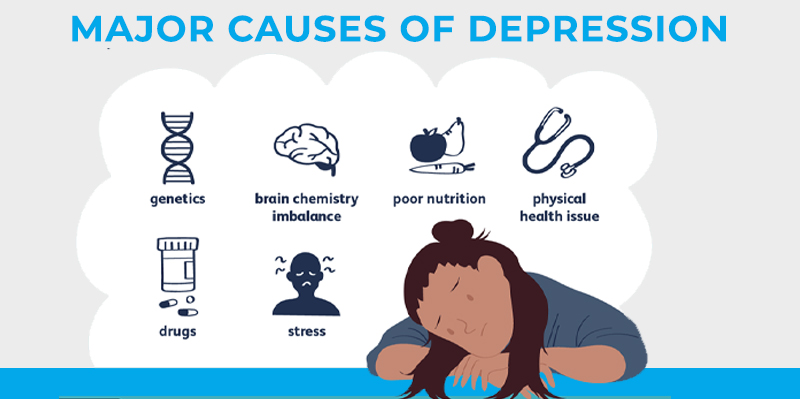Knowing the symptoms of depression can help those who may be suffering from depression seek the proper treatment and care.
Depression can be an incredibly disabling and painful condition to suffer from. It is estimated that over 300 million people around the world are affected by depression, making it one of the most common mental disorders. Although symptoms may vary between individuals, there are some key symptoms that everyone should know about so they can recognize when someone needs help.
What Is Depression?
Depression is a common mental health disorder that can cause symptoms such as feelings of sadness, loss of interest in activities that used to be enjoyable, difficulty sleeping or sleeping too much, irritability, and fatigue. It can interfere with life activities like going to work or school and may cause physical symptoms such as weight changes and digestive issues. Treatments for depression vary but can include medication and therapy.
5 Major Symptoms Of Depression

1. Persistent feelings of sadness and hopelessness
A person suffering from depression may feel like they can’t escape the sadness they are feeling. They may have little to no hope that things will improve.
2. Loss of interest or pleasure in activities
People with depression may find it hard to take part in activities they previously enjoyed. This can include hobbies, spending time with friends, or even talking on the phone.
3. Insomnia or sleeping too much
Depression can affect sleep patterns, either leading to insomnia or sleeping too much.
4. Irritability and restlessness
People with depression may find it hard to focus and be easily frustrated by things that don’t normally bother them.
5. Unexplained physical symptoms
Physical symptoms such as headaches, digestive issues, or unexplained aches and pains can be symptoms of depression.
Depression is a serious condition that can have a major impact on an individual’s life if left untreated. If you or someone you know has any of the symptoms mentioned above, it may be time to seek professional help. With the right treatment, it is possible to manage symptoms and live a fulfilling life.
When To See A Doctor?
If symptoms of depression persist for more than two weeks, it is important to consult with a medical professional. A doctor can help diagnose the condition and provide a treatment plan that can help manage symptoms.
Depression is an extremely treatable condition and there are many resources available to those who are suffering. It is important to remember that help is available and that symptoms can be managed with the right treatment.
Major Causes Of Depression

The exact causes of depression are unknown, but there are likely to be many factors at play. Some potential causes include:
1. Biological factors: Genetics may play a role in the development of depression, as it tends to run in families.
2. Stressful life events: Major life changes such as death, divorce, or job loss can trigger symptoms of depression.
3. Neurotransmitter imbalances: Neurotransmitters, such as serotonin and dopamine, are thought to play a role in depression.
4. Substance abuse: Alcohol and drugs can make symptoms of depression worse.
It is important to remember that everyone experiences symptoms of depression differently, so it is important to seek help if symptoms persist for more than two weeks. With the right treatment plan, symptoms can be managed and individuals can continue living a fulfilling life.
FAQs
Is meditation a good way to help people with depression?
Meditation can be a great way to help relieve symptoms of depression. Studies have shown that meditation can increase positive emotions and reduce symptoms of anxiety and depression. Additionally, meditation can help to reduce stress and increase feelings of well-being. Meditation is an easy and accessible way to start managing symptoms of depression.
What does depression look like?
Depression can look different for each person. Some symptoms of depression may include persistent feelings of sadness and hopelessness, loss of interest or pleasure in activities, insomnia or sleeping too much, irritability and restlessness, and unexplained physical symptoms such as headaches, digestive issues, or aches and pains. It is important to remember that everyone experiences symptoms of depression differently so it is important to seek professional help if symptoms persist for more than two weeks. With the right treatment, symptoms can be managed and individuals can continue living a fulfilling life.
How do I avoid getting depressed?
Depression is a complex condition and difficult to avoid entirely. However, there are some things you can do to reduce your risk of developing symptoms of depression. Healthy lifestyle habits such as eating a balanced diet, exercising regularly, and getting enough sleep can help to keep symptoms at bay.
